
Fire Safety at Home – Are Your Smoke Detectors…Expired?
We just had a new baby girl in our household… (Yikes!)
So naturally, as “The Protector” I’ve been going around making sure everything meant to keep us safe is in good operating condition.
Speaking of, is it too early to start cleaning my gun collection?
Anyway, it’s a good thing I went poking around…
As you know, part of preparedness success is prevention of emergencies in the first place.
This includes Fire Safety at Home…
Sure, we put a lot of effort into building the perfect bug out bag and devising bug out plans, but when the rubber meets the road, we’d rather stay put and not have to use either, right?
Well, during my survey of the house I discovered what could have been a dangerous oversight on my part…
But before I get to that, let me set the stage.
For those of us in colder climates it’s that time of year where we start to see an uptick in weather related incidents. I don’t know about you and where you’re at, but all I have to do is flip on the news and I’ll probably see local reports of tragic house fires and carbon monoxide poisonings.
It’s far too common to be ignored.
As such, when it comes to fire safety at home, making sure smoke detectors and carbon monoxide alarms are working properly is extremely important.
But even if you’re lucky enough to live in year-round warmth, routine checks of your detectors and alarms is a good practice to get used to.
Notice I said smoke detectors and alarms, not just the batteries — but the units themselves.
And here’s where I almost screwed up…
Check NOW to See if You Need New Smoke Detectors
Most of us know we’re supposed to test our detectors monthly and replace the batteries 1-2 times per year as needed.
But did you know you’re supposed to actually replace the units themselves every 10 years regardless?
I didn’t either until recently…
Truthfully, most people including myself don’t give it a second thought! That’s really why I’m taking the time to write this, just in case you didn’t know already either.
Our house is just over 10 years old so I guess it’s time to swap them out…
If you own a house or rent an apartment, it’s worth a check to make sure yours are not expired, too! (A little Googling and I discovered the average house age in the United States is more than 37 years old!)
How to See if Your Smoke Detectors Are Expired
Go ahead, check your nearest smoke detector and see for yourself. When you pull it down, there should be a manufactured date stamped on there somewhere like mine pictured below. (I inverted the image so you wouldn’t have to stand on your head to read it.)
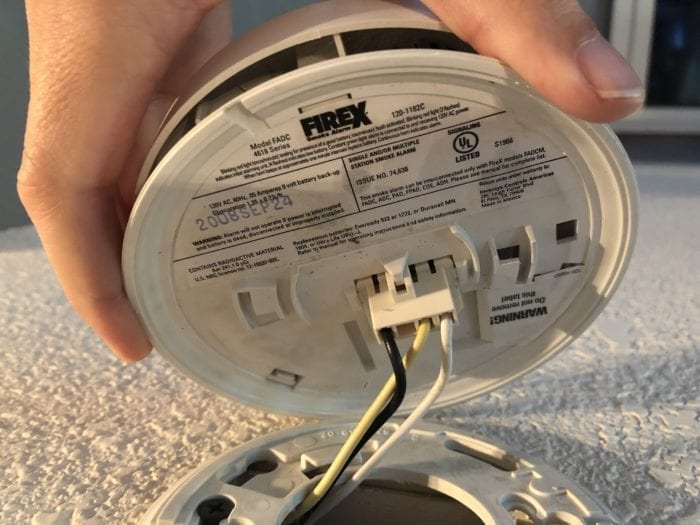
Go ahead, I’ll wait….
What’d you find out?
Now if you’re a natural skeptic like me you’re probably saying to yourself “Bah… They just say that to sell more smoke alarms!”
But people much smarter than myself say otherwise….
I’ll save you the technical details, but it has something to do with the sensor life in the detector that requires replacing them every so often. In fact, in search of replacement smoke alarms, I’ve seen most, if not all, only have a lifespan of up to 10 years. I guess that’s why.
Home Fire Safety Related Injuries and Deaths
If we’re honest, smoke detectors are boring. I even hesitated writing this article because they’re not really that exciting to talk about. I’d much rather talk about the latest survival gear.
Apart from firefighters and those whom have been impacted by a house fire before, I’d say it’s a safe bet that smoke detectors are something most of us take for granted. We probably don’t even realize they’re there until we burn food on the stove and set off the loud alarm with an accompanying plume of smoke.
That, or hunting down the low battery chirps at 3am…
But the reality is, they are a very important part of fire safety at home. And in some cases can mean the difference between life and death.
According to FEMA’s latest findings, “each year more than 2,500 people die and 12,600 are injured in home fires in the United States.” More than 60 firefighters per year are also said to die as a result of fighting fires for us.
Additionally, over 1,000,000 homes per year are said to experience higher than acceptable levels of carbon monoxide.
I’ll admit we didn’t even have CO alarms in our house before a friend of a friend suddenly died from carbon monoxide poisoning in their own home…
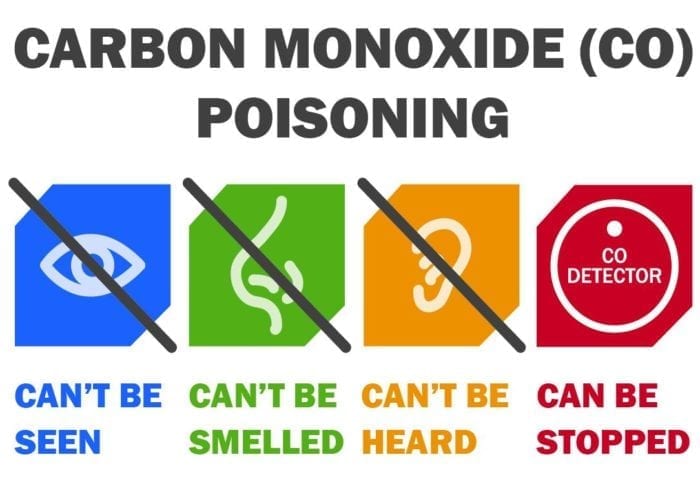
Image Source: http://www.bpihomeowner.org
Speaking of…
Do you have any carbon monoxide alarms in yours?
Before I was made aware I needed to replace my current smoke detectors, I ordered these simple CO plugin units off Amazon. They’re ready to go right out of the package. And the peace of mind they come with is worth far beyond the small investment!
House Fires Have Gotten Faster and More Deadly
While carbon monoxide is a lesser known, silent killer… Fire is the fast, destructive force we hear about the most. Even more so now than in previous years.
Did you know it used to take a fire 30 minutes or so to consume a standard room?
Now, due to changes in construction methods and materials over the past several decades, a fire can overtake a whole house in about 5 minutes.
That’s appalling and worth taking serious note…
The statistics go on to state that approximately 2/3rds of all fire related deaths are attributed to non-operational smoke detectors or none being present in the home at all.
Basically, your chance of dying in a house fire is cut in HALF with working smoke alarms.
And when it comes to dying, I like to increase my chances of survival.
Having properly working smoke and carbon monoxide alarms seems like a pretty easy way to do just that!
My Ideal Replacement Smoke Detectors
So now that I’m due up for new smoke detectors I’m seriously considering the Nest Protect system. This is just personal preference and not necessarily a recommendation for you.
I’m a bit of a tech nerd and the ease and convenience of a Wi-Fi thermostat and security system has been one of the better home improvement investments I’ve made in recent years.
Naturally, I believe the Nest Protect system would fit in nicely.
Like with my Nest thermostat and Nest security cameras, I really like the thought of having mobile app access and instant alerts in case of emergency while outside the home.
Like all Nest products, the Nest Protect smoke and carbon monoxide alarms are admittedly pricey, especially compared to the more affordable alternatives you can get. And since I have about 8 smoke detectors to replace, it would be quite costly to switch over completely.
Even so, if you have the budget, I think they would be worth a look as a worthwhile investment.
To begin, I may just upgrade one primary location on each floor to a Nest Protect, replace the others with a standard First Alert smoke detector and carbon monoxide alarm, and see how that works…
If the Nest products are out of your price range, here’s the more affordable alternative I’m looking at currently to pair with them. I recently installed these when we finished our basement and they seem to work as intended.
Keeping Fire Safety at Home Top of Mind
Like I set calendar reminders for replacing my furnace filters, I’m also going to set a calendar reminder for 10 years down the line to hopefully remind me to change out the smoke detectors again.
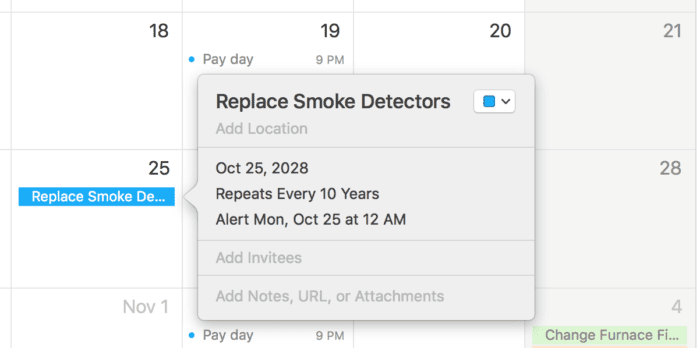
My memory isn’t quite what it used to be now, let alone 10 years from now. And as the saying goes, “Those who fail to plan, plan to fail…”
There’s certainly nothing wrong with enlisting the help of technology to free up some gray matter.
If you’re just getting into prepping or looking to get more organized in your preparedness efforts, using a calendar and/or journal to keep everything straight is a great way to stay organized and on top of things.
Bonus Tips for Cool Season Preparedness
I hope you found this article helpful and a timely reminder! I know it’s a bit different than what we normally talk about, but I also hope you appreciate the intent.
We’ll return to our regularly scheduled programming next time.
For now:
- If you’re in a cooler climate zone, now is a good time to swap out warm season clothing in your bug out bag for cool weather gear. (Heaven forbid we actually have to use it!)
- Also, it’s a good time to rotate out your food stores as well to make sure you have fresh provisions in your pack.
- Inspect your fire extinguishers to make sure they are fully charged and current.
- It’s a good time to have your furnace inspected/cleaned, replace your furnace filter and check around the house for any drafts that need attention.
- If you have a fireplace, inspect and perform the needed seasonal maintenance to ensure safe burning practices.
With this little extra time, attention and preparation you can have a safe,efficient home this winter for you and your loved ones.
So…What Did You Find?
When you checked your smoke detectors, what did you find? Were they expired? Did this article encourage you to get carbon monoxide alarms? Let me know in the comments below.
If I helped out just one of you, it will have all been worth it!
Also, if you think your friends could use a similar reminder, please share this with them using the share buttons provided!
Categorized in: Home Safety


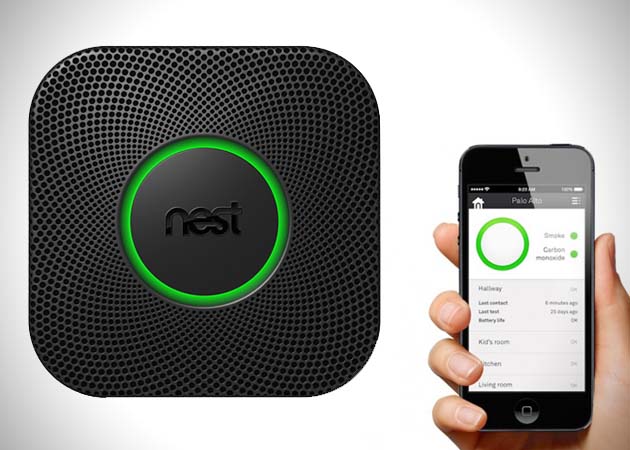
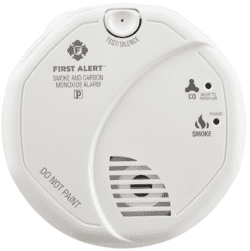




I just replaced all of our smoke detectors about 2 months ago. We have lived in the house 10 years. My carbon monoxide detector is 2 years old.
Nice work! Were they expired when you replaced them?